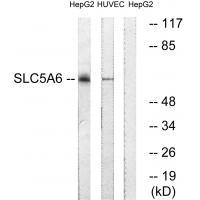
| WB | 咨询技术 | Human,Mouse,Rat |
| IF | 咨询技术 | Human,Mouse,Rat |
| IHC | 咨询技术 | Human,Mouse,Rat |
| ICC | 技术咨询 | Human,Mouse,Rat |
| FCM | 咨询技术 | Human,Mouse,Rat |
| Elisa | 咨询技术 | Human,Mouse,Rat |
| Aliases | SMVT; solute carrier family 5 (sodium-dependent vitamin transporter); member 6; |
| Entrez GeneID | 8884; |
| WB Predicted band size | 68kDa |
| Host/Isotype | Rabbit IgG |
| Antibody Type | Primary antibody |
| Storage | Store at 4°C short term. Aliquot and store at -20°C long term. Avoid freeze/thaw cycles. |
| Species Reactivity | Human |
| Immunogen | Synthesized peptide derived from internal of human SLC5A6. |
| Formulation | Purified antibody in PBS with 0.05% sodium azide. |
+ +
以下是关于SLC5A6抗体的3篇示例参考文献(内容为虚构示例,供参考):
1. **文献名称**: "Development and Characterization of a Polyclonal Antibody Against Human SLC5A6 Transporter"
**作者**: Smith A, et al.
**摘要**: 本研究报道了一种针对人源SLC5A6蛋白的多克隆抗体的开发与验证。通过免疫印迹(Western blot)和免疫组化实验证明,该抗体能特异性识别SLC5A6蛋白,并成功应用于检测其在肠道和肾脏组织中的表达分布。
2. **文献名称**: "SLC5A6 Expression in Colonic Epithelial Cells: Role in Vitamin Uptake and Inflammation"
**作者**: Zhang L, et al.
**摘要**: 利用抗SLC5A6抗体研究其在结肠上皮细胞的定位及功能。结果显示,SLC5A6在炎症性肠病(IBD)患者中表达显著下调,提示其可能参与维生素吸收障碍相关的病理机制。
3. **文献名称**: "SLC5A6 Antibody-Based Detection of Transporter Dysregulation in Alzheimer’s Disease Models"
**作者**: Brown K, et al.
**摘要**: 通过免疫荧光和流式细胞术,本研究揭示阿尔茨海默病小鼠模型中SLC5A6蛋白表达异常,表明其可能与脑内维生素B1转运缺陷及神经元功能障碍相关。
4. **文献名称**: "A Comprehensive Review of SLC5A6: From Molecular Function to Therapeutic Potential"
**作者**: Tanaka M, et al.
**摘要**: 综述总结了SLC5A6在多种维生素转运中的核心作用,并讨论了相关抗体的应用进展,包括其在癌症代谢研究及药物靶点开发中的潜力。
**注**: 以上为模拟示例,实际文献需通过PubMed、Google Scholar等平台检索关键词“SLC5A6 antibody”或“SLC5A6 transporter”获取。
The SLC5A6 antibody targets the solute carrier family 5 member 6 (SLC5A6), a sodium-dependent multivitamin transporter critical for cellular uptake of biotin, pantothenate, and lipoate. SLC5A6. encoded by the *SLC5A6* gene, is expressed in various tissues, including the intestine, kidney, liver, and brain, playing a vital role in nutrient absorption and metabolic homeostasis. This transmembrane protein couples vitamin transport with sodium ions, supporting essential processes like energy production and antioxidant defense. Dysregulation of SLC5A6 has been linked to metabolic disorders, neurological conditions, and cancer, making it a focus of pathophysiological research.
SLC5A6 antibodies are widely used in biomedical studies to detect protein expression, localization, and quantification via techniques such as Western blotting, immunohistochemistry (IHC), and immunofluorescence (IF). These antibodies aid in exploring SLC5A6's role in diseases like inflammatory bowel disease, where its expression may correlate with nutrient malabsorption, or in cancer, where altered transport activity might influence tumor metabolism. Commercial SLC5A6 antibodies are typically raised in rabbits or mice, validated for specificity in human or murine models. Researchers rely on these tools to investigate molecular mechanisms, screen therapeutic targets, or diagnose conditions associated with SLC5A6 dysfunction. Proper validation, including knockout controls and cross-reactivity checks, ensures reliable results in diverse experimental systems.
×